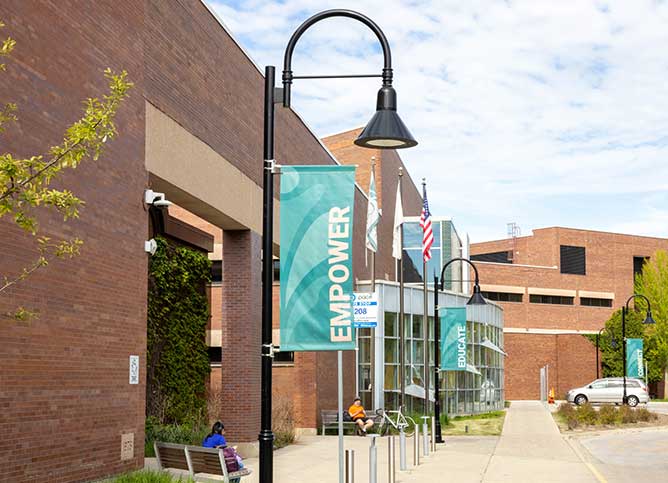Substance use and abuse—including alcohol, opioids and other drugs—continues to be a major issue for many Americans. There's hope, though, in those dedicated to assessing and treating substance use and helping the people in their communities recover and overcome their addiction issues.
Oakton's Substance Abuse Counseling Program is designed to prepare you for employment as an alcohol and other drugs (AOD) counselor. Our program also provides counseling education and training for social services and human services professionals concerned with individuals and their families.
We offer an associate of applied science (A.A.S.) degree in substance abuse counseling, as well as certificates in preparatory substance abuse counseling and advanced substance abuse counseling. Our program and curriculum are accredited by the Illinois Certification Board (ICB) and the Illinois Alcohol and Other Drug Abuse Professional Certification Association (IAODAPCA) and meets the association's requirements to sit for the Certified Alcohol and Other Drug Counselor (CADC) certification examination.
ICB certification means that the counselor has demonstrated the knowledge, skills and core functions necessary to provide quality care to individuals seeking treatment of their alcohol and/or other drug use or dependence. It requires 40 hours of continuing education units (CEUs) every two years for recertification.
To learn more about this program and begin your work as a substance use counselor, please contact department chair Bakahia Madison, at 847.635.1845 or bmadison@oakton.edu.
Enrolling at Oakton College can save you thousands of dollars and help you earn more over the course of your career. Our tuition is among the lowest in the region, and we offer many ways to bring your costs down even more.
99 percent of Oakton students graduate without debt.
To help you get there, you can apply for a scholarship, which you don’t have to pay back. We award $12 million in scholarships annually. Financial Aid includes grants, loans, and other forms of financial assistance that can reduce your costs of attending college.
We offer payment options that give you control over how you pay. Pay all at once or spread your payments over the course of the semester.
Learn more about your options for paying for your education


Each state and territory has different licensure and certification requirements. Oakton has researched and/or contacted state licensing authorities to confirm that the program meets the educational requirements leading to professional licensure. Other licensure requirements may include professional certification exams, background checks, years of work experience, fingerprinting, etc.
Licensure information is reviewed and updated on this site in June of each year. Licensure information is reviewed and updated on this site in June of each year. As of June 1, 2023, we have determined that individuals that successfully complete the Oakton’s Substance Abuse Counseling Program curriculum:
Meets the education requirements leading to licensure/certification in these states and U.S. Territories: Illinois
Does NOT meet the education requirements For licensure/certification in these states and U.S. Territories: Alabama, Alaska, American Samoa, Arizona, Arkansas, California, Colorado, Connecticut, Delaware, District of Columbia, Florida, Georgia, Guam, Hawaii, Idaho, Indiana, Iowa, Kansas, Kentucky, Louisiana, Maine, Maryland, Massachusetts, Michigan, Minnesota, Mississippi, Missouri, Montana, Nebraska, Nevada, New Hampshire, New Jersey, New Mexico, New York, North Carolina, North Dakota, Northern Mariana Islands, Ohio, Oklahoma, Oregon, Pennsylvania, Puerto Rico, Rhode Island, South Carolina, South Dakota, Tennessee, Texas, U.S. Virgin Islands, Utah, Vermont, Virginia, Washington, West Virginia, Wisconsin, Wyoming
Please note that the CADC credential is not eligible for reciprocity, the CADC is an Illinois specific credential. If you currently hold a CADC, you must transition to the CRADC level or above to reciprocate to other states.
If you intend to practice in any state other than Illinois, you should contact the appropriate licensing agency to independently verify whether Oakton’s program satisfies the educational requirements for licensure in a particular state before beginning Oakton’s program. Be aware that state licensure requirements may change from time-to-time and that states may have conditions for licensure in addition to educational requirements.
This information is provided to meet the Disclosure Requirements for Academic Programs Leading to Professional Licensure or Certification.
Oakton's professors and lecturers are experts in their fields with advanced degrees and years of real-world experience.
In addition to classroom learning, students receive support from our panel of expert advisors.
Bakahia Madison, LCPC
Chair and Professor
M.A. Roosevelt University
Psy.D. Illinois School of Professional Psychology
bmadison@oakton.edu
847.635.1845
Office: 2727, Des Plaines
Meet our part time faculty:
Anthony Bertram, LCSW, CADC, CODP
Lecturer
B.C.J. Marian University
M.S.W. Loyola University, Chicago
abertram@oakton.edu
874.635.1910
Office: B206, Skokie
Richard Lyon, M.A., LCPC, CADC, CAMS-II
Lecturer
rlyon@oakton.edu
847.635.1910
Office: B206, Skokie
Carolyn Ransom-Champion, Ed.D, CADC
Lecturer
B.A. National-Louis University
Ed. D, Argosy University, Chicago
cchampion@oakton.edu
847.635.1910
Office: B206, Skokie
Cathy Willis
Lecturer
B.A. National-Louis University
M.A. Northeastern Illinois University
cwillis@oakton.edu
847.635.1910
Office: B206, Skokie
Dr. Karen White, Ed.D, CADC
Executive Director of T.E.E.C.H
Jim Eaglin, CADC
Program Director, Family Behavioral Health Center
Edward A. Halverson, CADC
Director of DUI Services
Arlington Center for Recovery
Nicole Espinoza, LCSW
Social Services Coordinator
Health and Human Services Department
Village of Arlington Heights
Kate Mahoney, CADC
Director
Peer Services
Dr. Bakahia Madison, Psy D, LCPC
Chair and Professor
Oakton College
Jim Humenink, MA, LCSW
Executive Director
Northwest CASA (Coalition Against Sexual Assault)
Marc J. Battista
Associate Vice President of Workforce Education
Dean of Business & Career Technologies
Oakton College